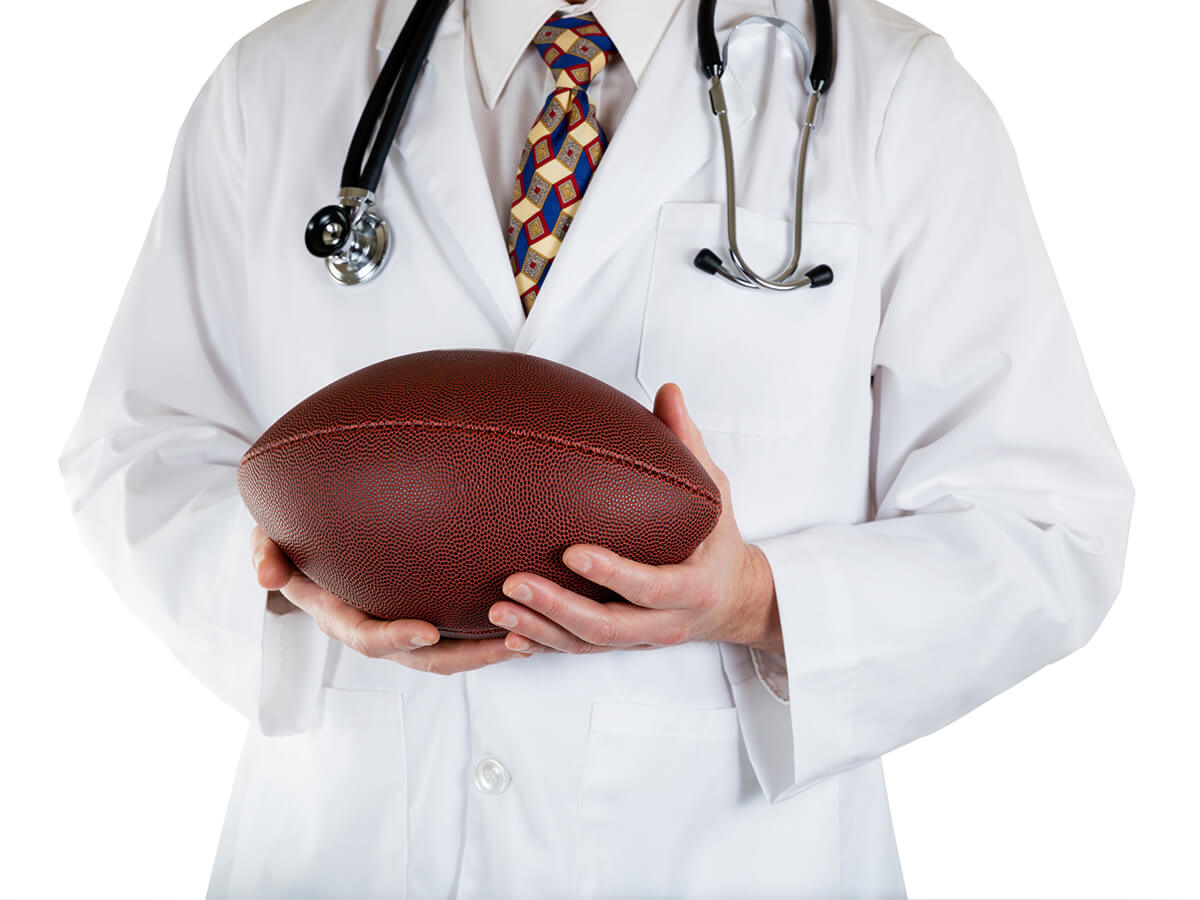Before we know it, fall will be here, and with it, the return of the NFL season. In addition to the players on the field, there are teams of NFL team doctors and sports medicine specialists who keep the offenses, defenses, and special teams in top shape.
According to the NFL Physicians Society (NFLPS), 192 team physicians (as of 2023) provide care to the 32 NFL teams and their players – on and off the field, and long before and after game time.
Usually, orthopedic surgeons and medical physicians accompany their team to practice, including summertime training campus and to evaluate players at the NFL Combine.
Dr. David Grier, an orthopedic surgeon and sports medicine specialist who also serves as communications council chair for the American Orthopedic Society for Sports Medicine, posits that being a sports medicine surgeon is not all about rubbing elbows with “the best athletes in the world.” Instead, Grier, who serves as team physician for the Charleston Battery (soccer club), reports that “while certainly being a sports medicine surgeon is a great career … being a team doctor, especially in the NFL, is not exactly what I could consider fun or easy.”
Sports Medicine Board Review Question
Before we go into the details about NFL team physicians, test yourself by answering the following Sports Medicine board exam question from BoardVitals on the role of the team physician. The answer and explanation can be found at the end of this article:
According to the rules of football, the person primarily responsible for players’ safety on the field is the referee. Therefore, the referee is the one who must give the team physician permission to enter the playing field. Given these rules, you are a team physician for an NFL football team when, during a game, you see a player drop to the ground and not moving. The referee has not yet noticed this player being down and precious time may be passing during which you could be assessing him. What do you do?
A. Try to signal the referee. Enter the field without permission if you are not able to get their attention very quickly
B. Enter the field immediately
C. Wait for the referee to grant you permission to enter the field
D. Have the coach call a time out
How Do You Become an NFL Team Physician?
After medical school graduation, most team physicians specialize in Orthopaedic Surgery, Internal Medicine, Family Medicine, or Emergency Medicine. After residency, next comes a fellowship (1-2 years) in a hospital, rehabilitation facility, or with a university’s athletic department. Previous experience as a team physician for high school or college sports team is common in NFL team physicians.
Board Certification in Sports Medicine is required of all medicine physicians joining as a Team Physician after 2011 as required by the 2011 Collective Bargaining Agreement (CBA) between the NFL and the NFL Players Association (NFLPA) according to the NFLPS.
Sports Medicine Board Certification is jointly developed by four boards of medicine. The certification exam is administered by both the American Board of Family Medicine (ABFM) as a subspecialty called a Certification of Added Qualification (CAQ) in Sports Medicine and the American Board of Internal Medicine (ABIM) as the Sports Medicine Certification Exam. The standard for passing is identical for all Boards.
To support your Sports Medicine Board Certification preparation, BoardVitals provides a specialized Sports Medicine CAQ board review exam question bank with 450+ Sports Medicine CAQ board questions and earn up to 30 AMA PRA Category 1™ Credit(s) and 30 ABIM MOC points while you study.
What do Sports Medicine Doctors Do?
In and beyond the high-stakes and -visibility world of pro sports, sports medicine doctors treat and prevent illness in all active people. This includes the child who plays on the local little league baseball team, to the daily or weekend jogger, to those of us who perform physically demanding or repetitive-action jobs, such as construction workers.
The primary goal? To restore patients’ functioning and ability to resume their normal sport, activity or lifestyle via surgical, restorative and preventive interventions.
Most sports medicine specialty practices include a clinical team, including physicians; licensed physical and occupational therapists; certified athletic trainers; and, in some cases, nutritionists and other professionals.
In the case of NFL physicians, in addition to providing injury treatment, they may also provide direction and support for other team physicians, athletic trainers, x-ray technicians, and paramedics who are also attending the NFL games.
Many sports injuries can be treated via non-surgical procedures, such as physical therapy, aquatic therapy or medication. However, when surgery is required, sports medicine physicians may perform surgeries such as knee arthroscopy, meniscectomy (for torn meniscus), medial epicondylectomy (for golfer’s elbow) and lateral epicondylitis debridement (tennis elbow).
Also, similar to NFL sports medicine doctors, sports medicine practices often contract with other local or regional organizations, such as schools, universities, sports clubs and teams, ski resorts and dance academies.
Some sports medicine physicians are fellowship-trained to specialize in treating or reconstructing particular body parts and their injuries, such as shoulders, hips, ankles, hands or knees. Or physicians can singularly focus on certain patient populations, such as those who treat sports-related injuries in children or youth.
Finally, through research, interviews, peer-reviewed publications and professional conferences such as those hosted by the American Medical Society for Sports Medicine, sports medicine doctors share their best-practice treatments for our sports-related injuries. Equally, NFL doctors provide education and contribute to the literature that advances and improves how professional football is played.
How much do NFL Team Physicians make?
The average salary for an NFL team doctor varies, but it can range from $200,000 to $512,000 per year. Factors that play into salaries include experience, location, and role. For example, Orthopedic Surgeons make earn an average of $489,370, while Sports Psychiatrists earn an average annual salary of $157,797.
Sports Medicine Board Review Question Answer & Explanation
Here’s the answer and explanation to the BoardVitals Sports Medicine board review question above:
Correct Answer:
A. Try to signal the referee. Enter the field without permission if you are not able to get their attention very quickly
This is a common dilemma in sports medicine, to follow game rules versus your medical knowledge. It is best to try to stay within game rules but not if it means a potentially worse outcome for a patient.




